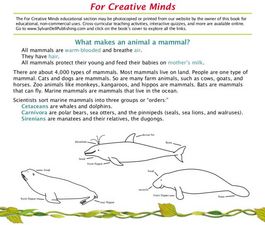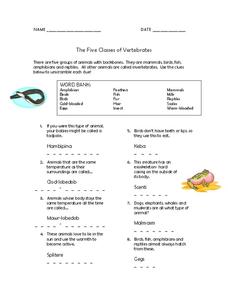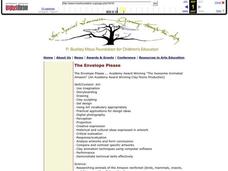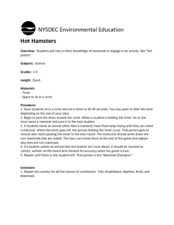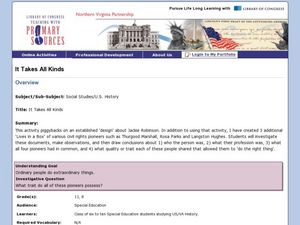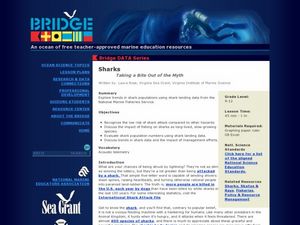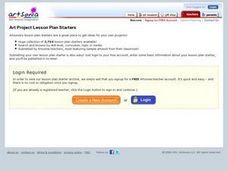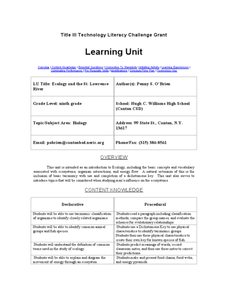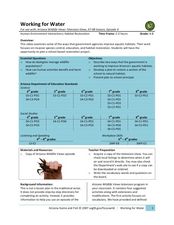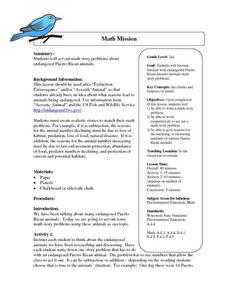Curated OER
Classy
Students explore the classification system in this seven lessons unit. The diversity of life forms and their characteristics are examined using a microscope. Kingdoms, classes, and families are investigated.
Curated OER
For Creative Minds: What Makes an Animal a Mammal?
Students read about categories of mammals and their features. Students then construct a marine animal, using given print outs in the lesson. Students then create adaptations for their mammal, using a web site reference for guidance.
Curated OER
Animal Playing Cards
Students research animal characteristics including information about mammals, reptiles, birds, and fish. They place the information into a database and then, create playing cards using the information.
Curated OER
Aquatic Safari
Students use an Internet Web site to locate the scientific information about various marine species. They use the Internet to find the scientific information about marine animals.
Smarter Balanced
Classifying Vertebrates
What features do scientists use to classify animals into groups? Class groups examine a series of paired images of vertebrates (a bass and a trout, a toad and a newt, a crocodile and a tortoise, an owl and a robin, a tiger and a bear)...
Curated OER
The Five Classes of Vertebrates
In this vertebrates classification worksheet, 5th graders unscramble 15 words to find answers to clues. Each clue gives information about the characteristics of vertebrates.
Curated OER
The Envelope Please
Students research an animal of the rainforest. They create a computerized claymation to present their research.
Curated OER
Hot Hamsters
Using this quick activity, you can have your class review what they have learned about mammals. Learners sit in a circle, and take turns naming a mammal. This activity could be enriched by having learners go to their desks, identify a...
Curated OER
It Takes All Kinds!
Students view video clips and observe similarities and differences between animals. They sort animals into groups for a zoo. They make a graph of their observations and review scientific classifications.
Curated OER
Fun with Fictitious Animals
How can one differentiate between a dweezlebub and nessie? Use this fictitious creature dichotomous key to find out! Biologists of all ages will enjoy this creative way to learn about classification, including a chance to draw the...
Curated OER
Animal ABC Book
Students in class choose a letter of the alphabet and uses the Enchanted studying web site to pick which animal they copy and paint for their letter. Students copy animal printout and paint or color it.
Curated OER
Classification of an Invertebrate: Sponge
Students investigate the invertebrate sponge. In this invertebrates lesson plan, students observe the sponge, Grantia, using a dissecting microscope. Students answer questions about their observations and view six other invertebrates....
Curated OER
Sharks ~ Taking a Bite Out of the Myth
The first thing to know about this lesson is that the commercial fisheries data for the activity no longer seems to be available. That being said, there are fascinating links to other websites, some about the comparative odds of being...
Curated OER
The Game of Life
Students explore the game of life which refers to what happens to a species when most of the population is gone. In this endangered species activity, students describe what it means for a marine animal to be endangered. Students then...
Curated OER
It's A Jungle Out There!
Students report on an animal according to its appearance, habitat, and characteristics.
Curated OER
Index of Organisms
In this biology worksheet, students fill in the description of a plant or animal. They write answers to 8 blanks and draw the organism's life cycle diagram.
Curated OER
Animals Galore
Third graders use structural characteristics to sort and classify animals into groups.
Curated OER
Ecology and the St. Lawrence River
Ninth graders complete a unit of lessons on ecosystems, organism interactions, and energy flow. They create a key for known species of fish, diagram the movement of energy through an ecosystem, and create and present food chains and food...
Curated OER
Arthur's Eyes
Students learn about the parts of the eye. In this eyes and vision instructional activity, students the story Arthur's Eyes and create a KWL chart about eyes. Students label the parts of the eye, examine the eyes of different animals...
Curated OER
Circulatory Systems
Excellent diagrams, labels and summaries make this resource be valuable to your students throughout the topic of circulation. All types of circulation vessels are explained, their structure and function is detailed, and the overall...
Curated OER
Circulatory Systems
A slideshow that covers the all-important details related to basic human circulation. The reasoning for exchange of material methods is presented and then labeled diagrams of the main human transfer systems are shown, along with...
Curated OER
Working for Water
Students examine the ways that government works to help improve aquatic habitats. In this water habitats lesson students view a video and plan a school restoration project.
Curated OER
Life at Risk
Students examine the characteristics of the peregrine falcon. They investigate endangered and extinct species, and how the environment affects the process.
Curated OER
Math Mission
Second graders investigate the concept of Puerto Rican animals through using math word problems. They create a story to correlate with the word problems. The lesson also uses data of species counts to show increases and decreases for...



